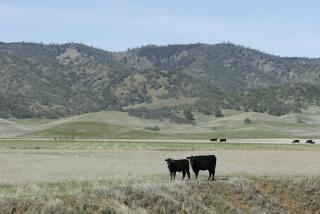Letters to the editor
FOR THE RECORD:
Hoover Dam: The caption on a photo of Hoover Dam that ran Feb. 27 said: “Under FDR, the U.S. built huge dams, such as Hoover Dam, to spur economic recovery.” Construction of the dam began under President Hoover and was completed in 1935, during Franklin D. Roosevelt’s first term. —
A great big . . . miss
Re “ Obama forgoes grand projects,” Feb. 23
This article’s subhead shouts, “Unlike the marvels of FDR’s New Deal, the stimulus is more about traffic, sewers and school repairs.”
Grand projects or not, President Obama’s stimulus plan seems to have missed the mark by a wide margin. How many of those people losing their jobs at Mervyns, Circuit City, Starbucks or even Lehman Bros. can put on a hard hat and find jobs repairing schools, building bridges or replacing aging sewers?
Very, very few, I suspect.
David Coffin
Los Angeles
The Times reports that “the Bay Area city of Hercules drew heat for listing a duck pond park and dog park as possible uses for stimulus money,” as did the proposed restoration of the National Mall.
What those opposed to both the New Deal’s initiatives and Obama’s stimulus package forget is that the nation’s most beloved parks were created or improved by the Works Progress Administration or the Civilian Conservation Corps. These civilian armies also created forests that have added immeasurably to the nation’s commonwealth and planted innumerable trees now gracing towns and cities in their maturity.
These unmarked gifts may not be as dramatic as Grand Coulee Dam, but they have improved the lives of generations of Americans without their knowledge. Why should we do less for our posterity?
Gray Brechin
Berkeley
The writer is a project scholar for California’s Living New Deal Project.
GOP response didn’t help
Re “‘We will rebuild, we will recover,’” Feb. 25
If Obama wasn’t a star before he delivered his speech Tuesday night, he is now.
This man is amazing. He has grace, charm, intelligence and a sense of humor -- and he’s a darn good politician. I get the distinct feeling that he reads those briefing books each night. It is reassuring.
As a friend of mine who describes himself as a staunch Republican wrote me: “At long last I’ve lived to see a grown-up president. He grows before our very eyes.”
Louisiana Gov. Bobby Jindal had an extremely tough act to follow, there’s no doubt of that. But his delivery was puzzling if not distracting, and his speech’s content was warmed-over Republican gruel. There are hard days ahead for the GOP if Jindal is their star.
Don Joel
Winnetka
::
There is no doubt that the stimulus will increase the national debt, and that is troubling. But the hypocrisy of Republicans complaining about increasing the debt is sickening. Their trickle-down policies and deregulation led to our dire situation.
Albert Einstein defined insanity as doing the same thing over and over and expecting different results. Most Americans understand that, and that’s why they are giving Obama the rope he is asking for to get us out of this mess. We are all just hoping that the rope will not hang us all.
Torin Roher
West Hills
::
You would think that the political outfall of Hurricane Katrina, a natural disaster that contributed richly to handing the Republican Party its head in 2006 and 2008, would have tempered some of Jindal’s remarks.
I speak of the rhetorical flourish that we are wasting $140 million a year on “something called volcano monitoring. ... Instead of monitoring volcanoes, what Congress should be monitoring is the eruption of spending in Washington, D.C.”
Is spending the tiniest fraction of the billions per year spent on weather monitoring, so vital to protecting Jindal’s own hurricane-prone state and the nation at large, a grotesque excess? Monitoring volcanoes protects millions of lives in the Pacific Northwest and Alaska from being devastated, in far greater numbers than could ever be contemplated from a hurricane, if Mt. Hood or Mt. Rainier were to erupt.
I raise this point not merely because Jindal marginalized a very serious natural-hazards issue for the sake of making a political joke, but because I am a conservative mourning the political joke my party has become.
Brian Wernicke
Pasadena
The writer is Chandler Family Professor of Geology at the California Institute of Technology.
Seeking answers about autism
Re “A dose of reality on autism,” editorial, Feb. 25
The court decision that additives in the measles vaccine do not cause autism may not be the final word on the issue.
As history has shown, officials tend to downplay beliefs of parents or other nonprofessionals. But parents have brought needed attention to this important issue, and the demand now should be that government and the pharmaceutical industry dedicate adequate resources to the discovery of any and all possible environmental causes for autism.
The age of the father as part of the incidence ratio does not explain the epidemic status of the condition.
Kjersten Jeppesen
Sun City
::
The Times’ editorial covers a number of issues involved with this condition, including the surge of autism cases over the last 20 years or so. But, as in all other discussions of the disease that I have read, I did not see one universally overlooked possibility.
As a practicing veterinarian for many years, I learned early on to limit the number of vaccines given on any one occasion; otherwise, I would frequently be treating that animal for illness within just a few days after the vaccines were given.
In today’s hurry-up world, small children are often given three or more vaccines in one office call, yet this possible cause is almost never mentioned in writings dealing with the subject.
Why is that? Is it just too obvious?
Bud Stuart
Santa Barbara
A different vote
Re “Galperin for City Council,” editorial Feb. 21
Let me get this straight: The primary qualification of the 5th District’s one and only city representative should be that he or she “take seriously” the concerns of the “mostly wealthy” district’s residents -- but not too seriously because that could result in “gridlock” at City Hall?
In other words, zealous, representative democracy sounds nice, but The Times worries that allowing the district’s residents just one committed voice (in a City Council of 15) is still one too many?
Although I share your concern for the “often greater needs” of the city’s other neighborhoods, I will be voting for David Vahedi because I am convinced that we will get better results, fewer regrets and happier citizens citywide when those of us who are most directly affected by a given proposal have a strong voice in the policymaking process.
Kevin Hughes
Los Angeles
More to Read
A cure for the common opinion
Get thought-provoking perspectives with our weekly newsletter.
You may occasionally receive promotional content from the Los Angeles Times.





